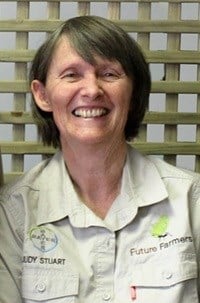






Judy Stuart: Young people who are passionate about farming and who are prepared to work hard are welcome to become future farmers. After an interview, we will try to help them to find positions on farms. Here, they will start on minimum wage and work upwards. This is an “Earn as you Learn” system. The young people who do really well and prove to have integrity, an excellent work ethic and humility, move on to overseas internships. At the moment, there are 18 interns abroad.
Stuart: Initially, as apprentices, they learn about hard work. They also learn all of the practical aspects of the operations, starting from the bottom and working their way up. Those who are successful in this two-year phase may be selected for overseas internships. These internships are life-changing. They will spend a year either in Australia or the USA, working with their particular speciality. This is a very exciting and stimulating event in their careers. More often than not, their leadership potential is revealed during the internship.
Although they learn new technical skills, they are exposed to first world work ethics and attitudes. They are living in a different cultural environment. It is so different from South Africa. These young people really grow and mature during this part of the programme. Not all future farmers qualify for overseas internships. It is based on their performance over the preceding years, reports from mentors and the references from their employers.
Stuart: Most of the young people who want to enter this field lack practical skills. Many of them have diplomas in agriculture, however, there is often a lack of practical experience. Many of the people who study agriculture are more interested in office jobs than farming. At Future Farmers, we try to equip those who are interested with practical skills and an understanding of what is going to be required in a professional commercial farming environment.
I feel that there is not enough focus on developing our young people as large-scale commercial farmers. The emphasis seems to be on small scale farming and subsistence farming.
We also find that many of the people who join future farmers do not understand what is required of them. Even the graduates are often not punctual or may decide to leave the job without giving notice and this is in spite of their education. There are norms, and even laws, that apply to the workplace. These are either misunderstood or ignored. This is where our mentors are valuable; advising and guiding. The apprentices need to understand that without solid track records, employment in the future is going to be difficult to come by. Our book, “Your Future: Our Future”, deals with many of these issues.
Stuart: There are some very good colleges that teach agriculture. Many of the graduates are not ready to work on farms. The theory is invaluable, but these graduates need to understand that they must be prepared to get their hands dirty and start from the bottom when they get to the farms. Sometimes it is difficult for them, however, we are working with many really fantastic graduates who are accomplishing a great deal.
AgriSETA is providing funding to assist graduates to gain practical experience. This is significant. But there are not many programmes for the young people who do not have diplomas and have been unable to access tertiary education. Many of our most successful future farmers joined our programme after leaving school. We need to reach more of these disadvantaged young people. So many of them have the passion and the drive to become successful, but they lack opportunity.
South Africa’s youth is its most valuable resource. It is more precious than all of our diamonds and gold. If they do not have opportunities, then an incredible asset is being wasted.
Stuart: There is a misperception that the youth of this country is not interested in farming. The numbers of aspirant farmers who come to Future Farmers for help, prove that this is not the case. We do not recruit people, they find out about Future Farmers and come to us. I believe that the ones who are really passionate will find their way. We welcome them.
There are hundreds in our database from all over South Africa, there are probably thousands who would love to become farmers. So much of our good agricultural land is lying fallow. There are land reform farms that should be productive and profitable. We need young people to be prepared to turn these potentially valuable tracts of land into profitable farming enterprises.
People see these failed farms, they know about the many failed cooperatives. They have learnt about what does not work. If we could do things differently and get competent young people to farm the land and to make it work, we would be addressing food security and we would be providing careers and employment for many future farmers.
Stuart: We need the successful commercial farmers in all of the sectors of agriculture to become involved and create opportunities for the youth. We need mentors to help the apprentices through the apprenticeships, advising them and guiding them. We need funding to make all of this possible. At Future Farmers, we are prepared to work with anyone who shares our goal which is to help the passionate youths of this country to become successful commercial farmers.
Our work is made possible by sponsors: Saville Foundation and Underberg Farmers Association for helping interns to travel to Australia, Bayer for core funding, AgriSETA and Kwanalu for funding for the WIL 200 project and the Future Farmers 15 project.
Stuart: When we started, there were only boys. They were from an agricultural high school and between us, we started Future Farmers. We do not recruit, but we do our best to help the people who come to us. There are many girls in Future Farmers now, but they did not start to knock on our door in the first few years of our existence. Our doors are open to any young South Africans who want to farm.
Stuart: We have future farmers on farms throughout the country. However, most of them are situated in KZN. This was our starting point and this is our hub. There are people on farms in other provinces, but it is impossible for us to go there to mentor them. We cannot deliver the service they deserve to those future farmers. We hope, one day, to have the resources to change this. There are a large number of participating farmers, but there are not enough. These farmers play a vital role in the programme.
Stuart: You really need to attend one of our Farmers Days to hear the future farmers share their stories! Most of the people who make it to the overseas internship become managers on their return and they are good managers. They have been in leadership positions overseas. They have achieved more than they ever believed possible. They have broken new ground in their personal lives. They have been judged, not according to who they are, but according to their ability and attitude.
They learn to believe in themselves, discover that they are valuable. They return with a newfound sense of dignity. They have worked harder than they ever thought could be possible. They have worked alongside people of many different nations and they have been outside South Africa, they have discovered a whole new world.
They bring back to our country additional skills, they learn about technology, but most important is the fact that they bring back a new approach to their work. Most of them are ready to take on anything and most of them will be successful. The best of our future farmers are ready to farm in their own right. Though none of them do, the opportunities have not been there for them. We are continuing to work to help them to accomplish this important step in their farming careers.
